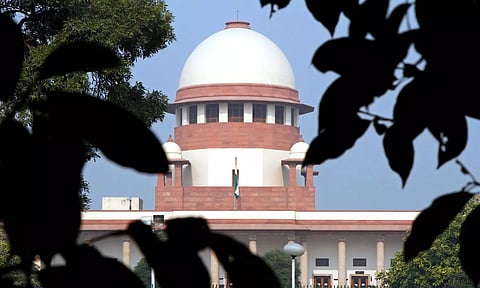

NEW DELHI: The Centre told the Supreme Court on Tuesday that the union territory status of Jammu and Kashmir is not a “permanent thing” and that it will make an elaborate statement on the vexatious political issue in the court on August 31.
The central government’s response was conveyed to the court by Solicitor General Tushar Mehta, after a five-judge constitution bench headed by Chief Justice DY Chandrachud, hearing the pleas challenging the abrogation of Article 370, asked it to set a specific time frame for restoration of electoral democracy in the erstwhile state.
“The union territory status of Jammu and Kashmir is not a permanent thing. So far as Ladakh is concerned, its UT status is going to remain for some time,” Mehta said.
The top government law officer said he will make an elaborate statement on the future of the union territory status of J-K and Ladakh before the bench, which also comprises Justices Sanjay Kishan Kaul, Sanjiv Khanna, BR Gavai and Surya Kant, on August 31.
The bench, which was hearing Mehta’s submissions defending the Centre’s decision to do away with the special status of the former state and its reorganisation, said, “Democracy is important, although we agree that in view of the national security scenario, reorganisation of the state can be done.”
The court, however, said lack of electoral democracy cannot be allowed to go on indefinitely.
“This has to come an end... give us the specific time frame as to when will you restore actual democracy. We want to record this,” the bench said, and asked Mehta and Attorney General R Venkataramani to seek instructions from the political executive and get back to the court.
By enacting Article 35(A), you virtually took away fundamental rights: CJI
Chief Justice of India D Y Chandrachud observed that by enacting Article 35A, fundamental rights of equality, liberty to practice profession in any part of the country and others were virtually taken away. He made the remarks after Solicitor General Tushar Mehta, appearing for the Centre, referred to the contentious provision in the Indian Constitution, saying it gave special rights to only permanent residents of the J&K and was discriminatory.
The Centre told a five-judge bench headed by CJI Chandrachud that citizens have been misguided that the special provisions for J&K were “not discrimination but a privilege”. “Even today two political parties are before this court defending Article 370 and 35A,” the solicitor general told the top court on the 11th day of hearing the litany of pleas challenging the abrogation of the constitutional provision which bestowed special status to the erstwhile state of J&K.